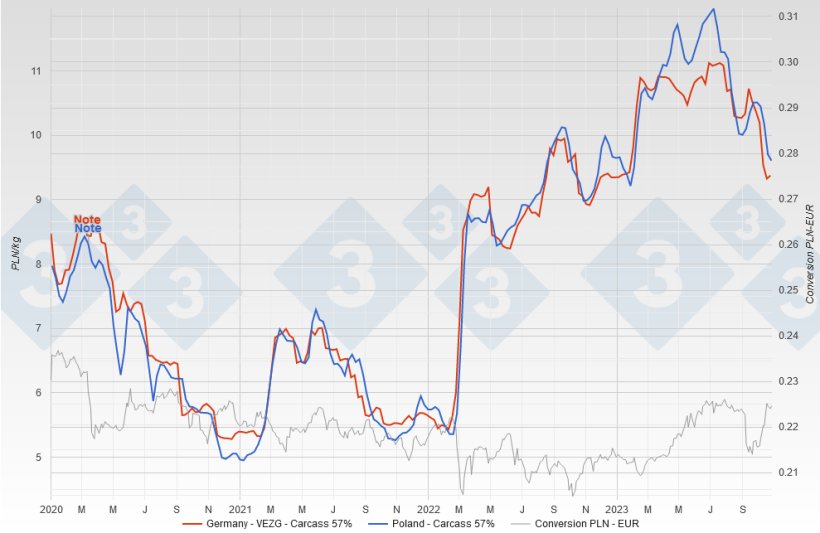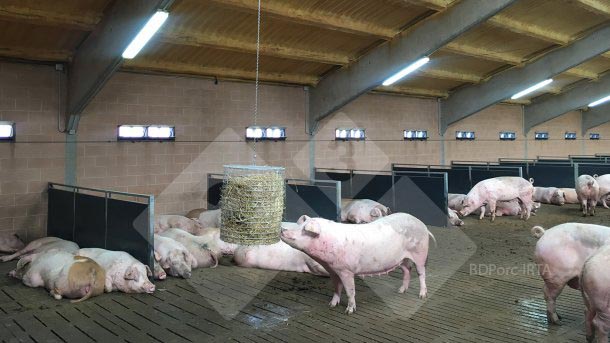November has begun. Over the past month, the Polish pig price has fallen as expected, due not only to decreases in the German market but also to the strengthening of the zloty against the euro. In the last week of October, the price in Poland was already below PLN 10 per kg for class E - lower than a month earlier, but higher than our western neighbors. What is the reason for this? - the availability of animals for slaughter. Across the Oder river, it is still higher than in Poland, which means that slaughterhouses are ready to pay more, because there is a problem with importing anyway, as the census is not only a problem in Poland but also in many other Western European countries.


So, are we facing an increase in domestic pig prices? It's hard to answer unequivocally. Undoubtedly, two things speak in favor of an increase - firstly, the domestic population, and secondly, Christmas is already approaching - and this always stimulates the market for increased purchases. These two factors will play in favor of farmers not only in Poland but also in other Western European countries. Unfortunately, there are also factors that will prompt price reductions, the most important being the international pork trade situation.
Spain has been overtaken in pork trade with China by Brazil, long underestimated, which has some of the lowest production costs and therefore prices. Another overseas major pork tycoon, the US, has a lower finished product price than Europe's leading pig producer. This makes the pork produced in the EU unattractive for trade. In order for this to change, the price needs to go down. On top of that, in China, due to continued problems with ASF, the supply of finishing pigs on the market has suddenly increased, which causes the price to decrease in China, so expensive EU pork has a hard time getting sold. If international trade fails to materialize, what will happen to the pork? Spain has more than it needs - they will be forced to send it to the European market and they are doing so. Will this cause price decreases? At the moment, at best, it changes nothing - pre-Christmas demand will absorb the goods, but will this situation last forever? Of course not.
During the year there are several times with higher and lower market demand for pork. We are now entering a period when this demand is higher, however, then this demand falls. Yes, immediately afterward in China we have the New Year, which in that culture is celebrated with feasts, however, will Europe be able to break into this market with cheap pork from Brazil, the US, and local pork (what the plants are slaughtering now at a lower price, they will certainly sell at a profit during the Chinese holidays)? - I doubt it. So we should think about how to reduce costs, and unfortunately, we have a sad conclusion here. We won't be able to do it unless EU legislation changes. This is described in this article by Guillem Burset.
In Spain, 14 market sessions finished with a reduction in the reference price, and it currently stands at €1.66 per kg live weight (PLN 7.40), which is as much as you can easily achieve by selling pigs at slaughter price in our country, and I remind you that Spain has the option to sell pork outside EU markets. We in Poland unfortunately do not, due to ASF. The reasons for the price decrease on the Iberian peninsula are American competition, which is pushing European meat out of foreign markets with its price, which has influenced the unwillingness of slaughterhouses to expand (they don't feel buying pressure), greater seasonal supply, declines in the price of components for the production of gelatin (it's all about offal, which is not very attractive on the meat market), and lower stocking rates resulting from PRRS (plants have reduced slaughtering for this reason and are not interested in increasing it now). These factors, according to the article's author, were key in causing prices to fall in Spain, but in my opinion, they are also affecting the European market - the prospect of being flooded with pork from the Iberian peninsula is alive among European producers. This causes plants to be unwilling to freeze and store meat. Currently, energy prices are high, and coupled with expensive pork and the uncertainty of whether we will be flooded with meat from the West any time soon, it causes a reluctance to buy pork for stock. This also affects lower demand from slaughterhouses, which prefer to meet the growing supply on an ongoing basis. This uncertainty is also evident in pricing, where everyone is afraid to lean out with a higher price.

So why are pork production costs and prices so expensive in Europe? Over the years, the EU has legislated to regulate the industry, as well as elements related to it. This has resulted not only in a decrease in livestock but more importantly in an increase in costs - elements that make European pork less and less competitive in the world. These include environmental regulations, animal welfare (current discussions about increasing space, which will prolong the return on investment), not to mention regulations related to energy, the price of which is rising at an alarming rate. These factors, according to Burset and myself, will result in the virtual disappearance of European pork trade in third markets, meaning Europe will strive for mere self-sufficiency. However, the free trade talks that have begun, such as with American countries, may result in an even worse trend. Countries there do not have the restrictions imposed on us by European politicians and therefore produce more cheaply. Under the free trade formula, they will be able to enter the EU market with attractively priced pork, which will further bury the industry on the continent. Will this be the case? Much depends on the upcoming elections to the European Parliament and what our representatives in Brussels will support.
Bartosz Czarniak



